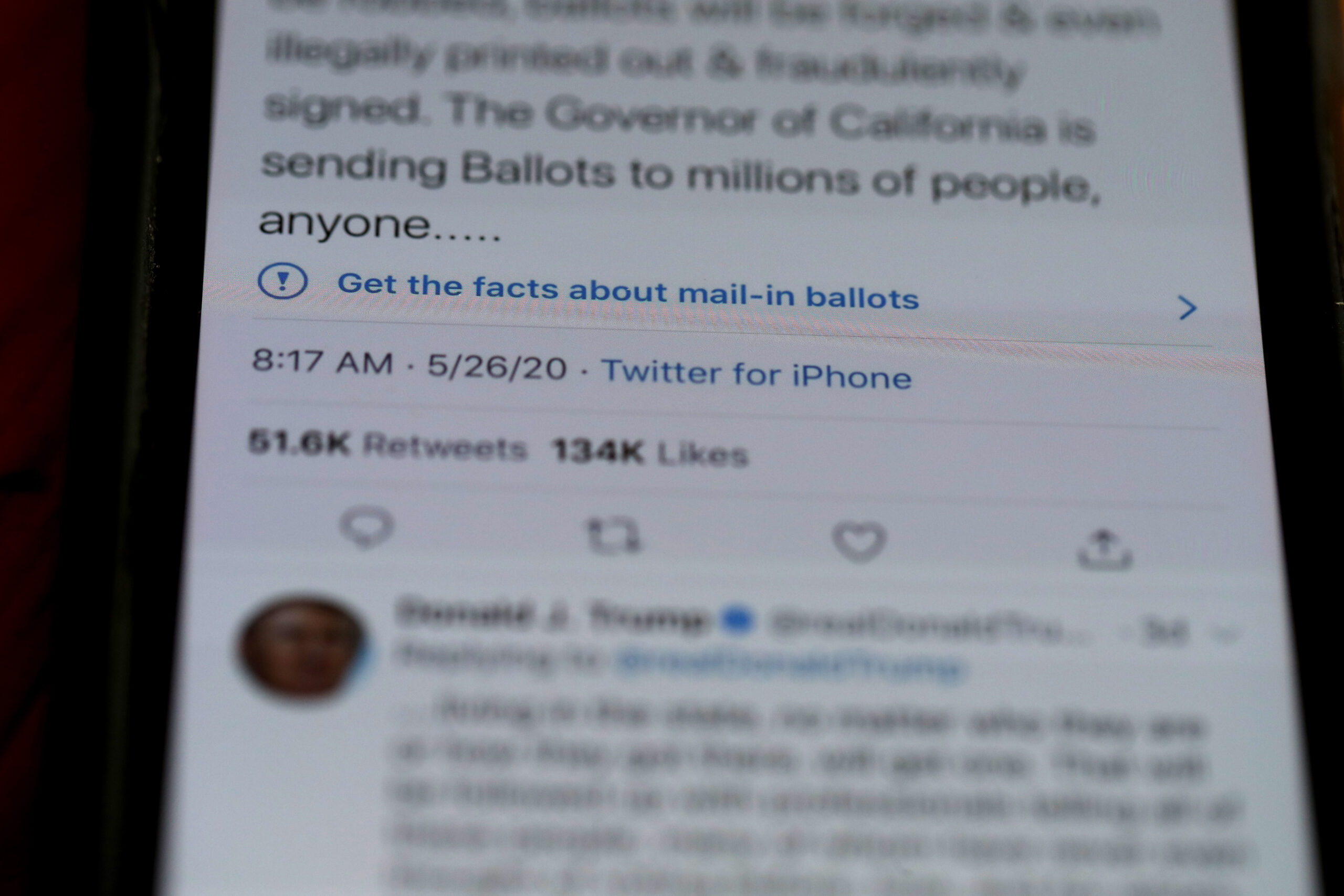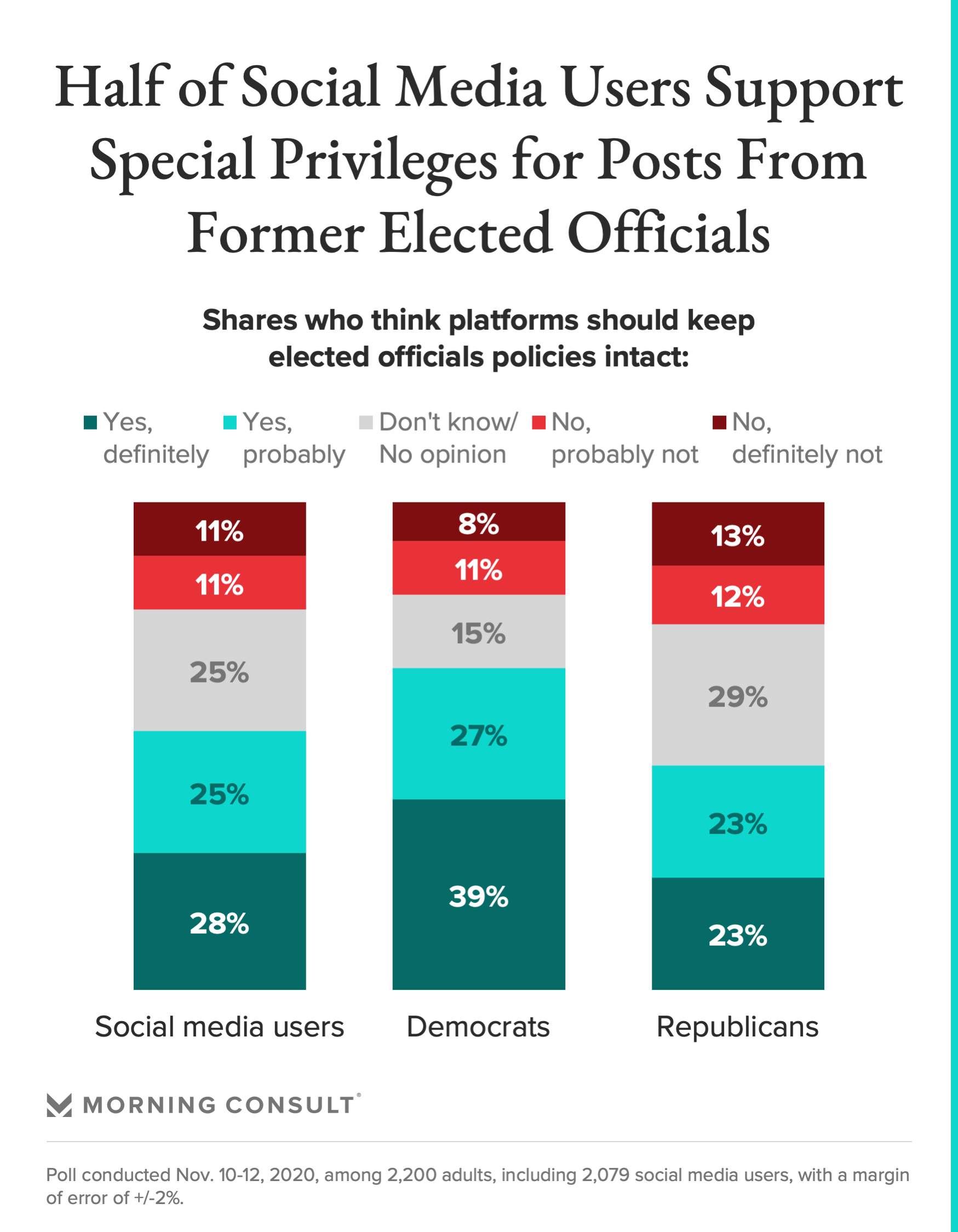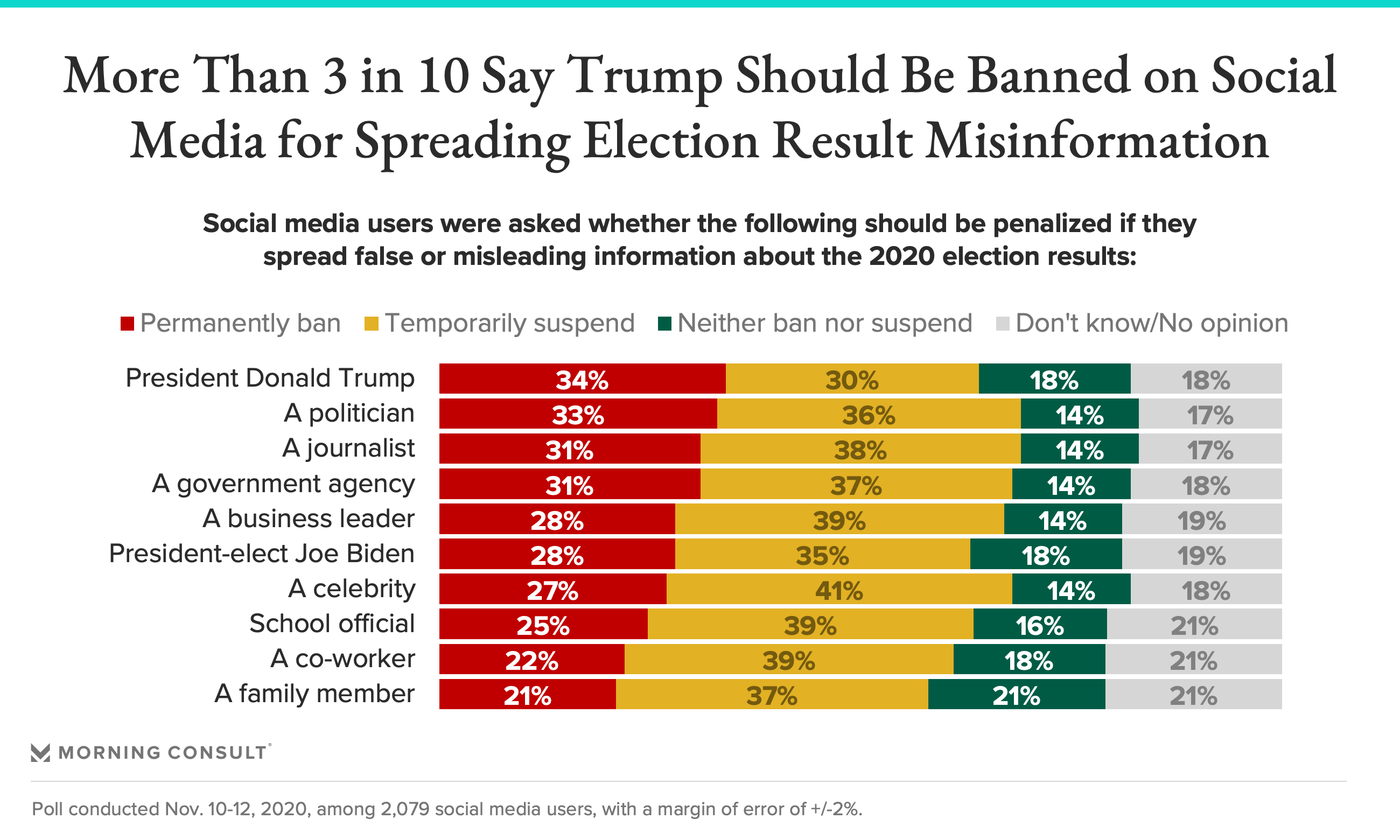SOCIAL
Trump’s Social Media Posts Could Face Different Moderation Rules Once He Leaves Office. Social …

- 66% of Democrats said the special rules should “definitely” or “probably” be applied to leaders after they leave office, compared to 46% of Republicans.
- 34% of social media users said Trump should be banned from platforms whenever he shares disinformation about the election results — the highest share among the list of figures included in the survey.
Come Inauguration Day on Jan. 20, President Donald Trump’s social media posts could be treated like those from any other user, with the potential that his account could be suspended or banned from the platform whenever he routinely violates a company’s moderation rules, instead of receiving a warning label or other more lenient treatments like his posts do now.
A new Morning Consult survey suggests, however, that most social media users don’t appear to have a strong appetite for seeing a former head of state’s accounts treated like any other.

According to the survey conducted Nov. 10-12 among 2,079 social media users, 53 percent said special policies for moderating social media posts from elected officials, such as the sitting president or other heads of state, should “definitely” or “probably” apply to those same accounts once the official leaves office. Another 25 percent said they were unsure or didn’t have an opinion.
Given how the posting policies would impact Trump, Democrats, perhaps surprisingly, appeared more inclined to say that the special rules should “definitely” or “probably” be applied after elected officials leave office, with 66 percent saying so compared to 46 percent of Republicans.
The survey has a margin of error of 2 percentage points.
During testimony before the Senate Judiciary Committee on Tuesday, Twitter Inc. Chief Executive Jack Dorsey confirmed in a question from Sen. Cory Booker (D-N.J.) that his platform will no longer apply its “public interest” policies to Trump’s tweets, which typically protects the president from being banned or suspended after multiple rule violations. On the other hand, Facebook Inc. CEO Mark Zuckerberg said Trump’s posts will continue to be treated as they are, and a company spokesperson said following the hearing that like all other former candidates and elected officials, Trump’s posts will continue to be eligible for fact-checking by the company’s third-party fact-checking partners.
Since Trump arrived on the political stage in 2015, his use of the major social media platforms — especially Facebook, Twitter and Google’s YouTube — have prompted the companies to examine how politicians factor into their content moderation policies, including those targeting false or misleading information, harassment and offensive content.
Over the years, their approaches have varied: Twitter arguably has had the strictest approach, which mostly relies on placing the content behind a warning label that users have to click through. And executives at Facebook and YouTube long argued that exempting Trump’s posts that violate their platforms’ rules from punishment was necessary because of their news value. Both companies have started placing more labels on the president’s posts, especially about the coronavirus pandemic and the 2020 elections.
Despite that, Trump’s posts have continued to be a strong source for misinformation about the elections, specifically. A New York Times analysis published Monday indicates that Trump included unsubstantiated falsehoods about voter fraud in over 300 tweets since election night on Nov. 3. And an October report from Harvard University’s Berkman Klein Center for Internet and Society concluded that Trump’s personal Twitter account was one of the top sources for disinformation about mail-in voter fraud in this year’s elections. The study analyzed more than 55,000 online media stories, 5 million tweets and 75,000 posts on public Facebook pages.
 And while social media users aren’t so sure that platforms should start moderating the president’s posts like any other, they do appear to have a stronger appetite for seeing enforcement actions against Trump’s posts that spread false or misleading information about the 2020 U.S. election results.
And while social media users aren’t so sure that platforms should start moderating the president’s posts like any other, they do appear to have a stronger appetite for seeing enforcement actions against Trump’s posts that spread false or misleading information about the 2020 U.S. election results.
In the poll, 34 percent of social media users said the president should be banned from social media platforms when he posts disinformation about the election results — the highest share among the list of public figures included in the survey. Thirty percent said Trump’s account should be temporarily suspended for spreading such false or misleading election information.
For comparison, 28 percent of social media users said President-elect Joe Biden’s account should be banned if he were to share misleading or false information about the election results, and 35 percent said he should be suspended.
Shannon McGregor, senior researcher at the University of North Carolina’s Center for Information, Technology, and Public Life, said overall, the general sentiments that social media users have about banning or suspending the president appears to align with the platforms’ existing approaches.
“There’s some, but not necessarily overwhelming, appetite for political leaders to be banned, or even suspended,” McGregor said. “It seems as if people might not understand quite the impact that political elites and public figures have on public discourse.”
SOCIAL
Snapchat Explores New Messaging Retention Feature: A Game-Changer or Risky Move?

In a recent announcement, Snapchat revealed a groundbreaking update that challenges its traditional design ethos. The platform is experimenting with an option that allows users to defy the 24-hour auto-delete rule, a feature synonymous with Snapchat’s ephemeral messaging model.
The proposed change aims to introduce a “Never delete” option in messaging retention settings, aligning Snapchat more closely with conventional messaging apps. While this move may blur Snapchat’s distinctive selling point, Snap appears convinced of its necessity.
According to Snap, the decision stems from user feedback and a commitment to innovation based on user needs. The company aims to provide greater flexibility and control over conversations, catering to the preferences of its community.
Currently undergoing trials in select markets, the new feature empowers users to adjust retention settings on a conversation-by-conversation basis. Flexibility remains paramount, with participants able to modify settings within chats and receive in-chat notifications to ensure transparency.
Snapchat underscores that the default auto-delete feature will persist, reinforcing its design philosophy centered on ephemerality. However, with the app gaining traction as a primary messaging platform, the option offers users a means to preserve longer chat histories.
The update marks a pivotal moment for Snapchat, renowned for its disappearing message premise, especially popular among younger demographics. Retaining this focus has been pivotal to Snapchat’s identity, but the shift suggests a broader strategy aimed at diversifying its user base.
This strategy may appeal particularly to older demographics, potentially extending Snapchat’s relevance as users age. By emulating features of conventional messaging platforms, Snapchat seeks to enhance its appeal and broaden its reach.
Yet, the introduction of message retention poses questions about Snapchat’s uniqueness. While addressing user demands, the risk of diluting Snapchat’s distinctiveness looms large.
As Snapchat ventures into uncharted territory, the outcome of this experiment remains uncertain. Will message retention propel Snapchat to new heights, or will it compromise the platform’s uniqueness?
Only time will tell.
SOCIAL
Catering to specific audience boosts your business, says accountant turned coach

While it is tempting to try to appeal to a broad audience, the founder of alcohol-free coaching service Just the Tonic, Sandra Parker, believes the best thing you can do for your business is focus on your niche. Here’s how she did just that.
When running a business, reaching out to as many clients as possible can be tempting. But it also risks making your marketing “too generic,” warns Sandra Parker, the founder of Just The Tonic Coaching.
“From the very start of my business, I knew exactly who I could help and who I couldn’t,” Parker told My Biggest Lessons.
Parker struggled with alcohol dependence as a young professional. Today, her business targets high-achieving individuals who face challenges similar to those she had early in her career.
“I understand their frustrations, I understand their fears, and I understand their coping mechanisms and the stories they’re telling themselves,” Parker said. “Because of that, I’m able to market very effectively, to speak in a language that they understand, and am able to reach them.”Â
“I believe that it’s really important that you know exactly who your customer or your client is, and you target them, and you resist the temptation to make your marketing too generic to try and reach everyone,” she explained.
“If you speak specifically to your target clients, you will reach them, and I believe that’s the way that you’re going to be more successful.
Watch the video for more of Sandra Parker’s biggest lessons.
SOCIAL
Instagram Tests Live-Stream Games to Enhance Engagement

Instagram’s testing out some new options to help spice up your live-streams in the app, with some live broadcasters now able to select a game that they can play with viewers in-stream.
As you can see in these example screens, posted by Ahmed Ghanem, some creators now have the option to play either “This or That”, a question and answer prompt that you can share with your viewers, or “Trivia”, to generate more engagement within your IG live-streams.
That could be a simple way to spark more conversation and interaction, which could then lead into further engagement opportunities from your live audience.
Meta’s been exploring more ways to make live-streaming a bigger consideration for IG creators, with a view to live-streams potentially catching on with more users.
That includes the gradual expansion of its “Stars” live-stream donation program, giving more creators in more regions a means to accept donations from live-stream viewers, while back in December, Instagram also added some new options to make it easier to go live using third-party tools via desktop PCs.
Live streaming has been a major shift in China, where shopping live-streams, in particular, have led to massive opportunities for streaming platforms. They haven’t caught on in the same way in Western regions, but as TikTok and YouTube look to push live-stream adoption, there is still a chance that they will become a much bigger element in future.
Which is why IG is also trying to stay in touch, and add more ways for its creators to engage via streams. Live-stream games is another element within this, which could make this a better community-building, and potentially sales-driving option.
We’ve asked Instagram for more information on this test, and we’ll update this post if/when we hear back.
-

 PPC5 days ago
PPC5 days ago19 Best SEO Tools in 2024 (For Every Use Case)
-

 MARKETING7 days ago
MARKETING7 days agoStreamlining Processes for Increased Efficiency and Results
-
SEARCHENGINES6 days ago
Daily Search Forum Recap: April 17, 2024
-

 PPC7 days ago
PPC7 days ago97 Marvelous May Content Ideas for Blog Posts, Videos, & More
-

 SEO7 days ago
SEO7 days agoAn In-Depth Guide And Best Practices For Mobile SEO
-
SEARCHENGINES5 days ago
Daily Search Forum Recap: April 18, 2024
-

 MARKETING6 days ago
MARKETING6 days agoEcommerce evolution: Blurring the lines between B2B and B2C
-
SEARCHENGINES4 days ago
Daily Search Forum Recap: April 19, 2024













